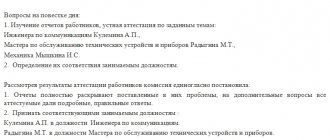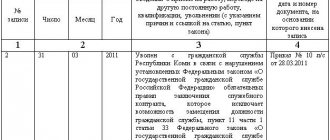Legislative framework for certification
The Federal Legislation of the Russian Federation establishes the rules and frequency of certification for civil servants. Law No. 79 establishes the mandatory passing of an examination for suitability for the position held at least three times a year.
In special cases, certifications may be carried out more frequently. These are:
- special instructions for recertification for managers and advisers;
- certification appointed by decree of the President or the Government;
- extraordinary exams.
Important . Current legislation does not restrict civil servants from undergoing certification at their own request or by agreement with their manager.
https://youtu.be/hPNXBJckTaU
Legal act on certification
The certification commission is formed by a legal act of a state body in accordance with parts 9-12 of Article 48 of the Federal Law of July 27, 2004 N 79-FZ “On the State Civil Service of the Russian Federation”.
The personnel service of the state body, no less than a week before the start of certification, must familiarize each civil servant being certified with the submitted feedback on the performance of his official duties during the certification period.
Can a civil servant refuse to undergo certification due to the fact that he has already signed a notice of reduction of his position?
The number of independent experts must be at least one quarter of the total number of members of the certification commission. The composition of the certification commission is formed in such a way as to exclude the possibility of conflicts of interest that could affect the decisions made by the certification commission.
Certification is carried out in order to determine the suitability of a civil servant for the civil service position being filled based on an assessment of his professional performance.
After one month after the certification, the transfer of a civil servant to another position or his dismissal from the civil service based on the results of this certification is not allowed. The time of illness and vacation of a civil servant is not counted in the monthly period.
The approval of the certification schedule is approved by the head of the body and is brought to the attention of each certified person at least one month before the start of certification.
It should be noted that their provisions, to a certain extent, can be used when organizing certification of other categories of employees, including in non-governmental organizations.
Candidates for representatives of a public council under a state body for inclusion in the certification commission are submitted by this council at the request of the head of the state body.
The decision of the certification commission is made in the absence of the civil servant being certified and his immediate supervisor by open voting by a simple majority of votes of the members of the certification commission present at the meeting.
In Art. 47 it is determined that the provisions of the official regulations are taken into account when conducting certification of a civil servant. Assessing the results of the professional performance of civil servants through certification is called one of the priority areas for the formation of personnel in the civil service (Article 60).
Article 82 contains a provision that when conducting certification, which may serve as a basis for dismissal of workers, a representative of the elected body of the relevant primary trade union organization must be included in the certification commission.
No later than two weeks before the start of certification, a review of the performance of official duties by the civil servant subject to certification for the certification period, signed by his immediate supervisor and approved by a superior, is submitted to the certification commission.
The certification commission is formed by a legal act of the state body in accordance with parts 9 - 12 of Article 48 of the Federal Law of July 27, 2004 N 79-FZ “On the State Civil Service of the Russian Federation”. The specified act determines the composition of the certification commission, the terms and procedure for its work.
Not all employees are subject to performance reviews. Certain categories of workers should not be included in the list of those certified:
- Employees working in the civil service for 11 months or less.
- Employees who are already 60 years old.
- Women in position.
- Mothers who are on parental leave.
- Women who returned to work after maternity leave and worked for 11 months or less.
- Managers who have entered into a fixed-term contract.
- Assistant (or “adviser”) working on a fixed-term contract.
- Workers who passed the qualification exam 11 months ago or less.
- Employees whose certification took place less than three years ago.
Encyclopedias and dictionaries usually interpret employee certification (Latin attestatio - certificate) as a procedure for determining the qualifications, practical skills, and business qualities of an employee and establishing his suitability for the position held. Certification is carried out with the aim of rational placement of personnel and their effective use.
In addition, any government body has developed and adopted a normative legal act (regulation, regulation or procedure).
Encyclopedias and dictionaries usually interpret employee certification (Latin attestatio - certificate) as a procedure for determining the qualifications, practical skills, and business qualities of an employee and establishing his suitability for the position held. Certification is carried out with the aim of rational placement of personnel and their effective use.
The Internet portal of the "Rossiyskaya Gazeta" (16+) was registered with Roskomnadzor on June 21, 2012. Certificate number EL No. FS 77 - 50379.
Who should undergo additional certifications?
There are quite a lot of reasons for holding an extraordinary examination to determine the suitability of a civil servant for the position held. Unscheduled certifications are assigned:
- one year after returning from parental leave;
- on unsatisfactory results of reports;
- by special orders of management;
- by agreement of the parties or on the civil servant’s own initiative;
- if you miss a scheduled exam without a valid reason;
- when changing the payroll system;
- when reducing the number of employees in a government agency.
If an exam is assigned to an employee due to low work results during the reporting period, based on the results of the certification, the issue of demoting the person in position will be decided.
However, not all employees of government agencies are required to undergo such testing. The following do not take part in scheduled and unscheduled examinations:
- pregnant women;
- persons on parental leave;
- employees with up to a year of experience at the place of employment;
- civil servants over 60 years of age;
- employees who passed certification less than a year ago.
Civil servants cannot refuse to undergo scheduled or extraordinary certification at their own request without a good reason. Such behavior will be regarded as a violation of labor regulations and will result in disciplinary punishment.
Important . Heads of government agencies are also required to undergo a professional suitability test. For them, the deadlines for passing certification are set separately.
Certification is a check of an employee’s professional training, suitability for his position, and determination of the growth prospects of the person being certified.
When conducting certification, the immediate supervisor of a civil servant provides a motivated review of the civil servant’s performance of official duties during the certification period. The reasoned review is accompanied by information about the assignments completed by the civil servant during the certification period and the draft documents prepared by him, contained in the annual reports on the professional performance of the civil servant, and, if necessary, an explanatory note from the civil servant on the review of the immediate supervisor.
Civil servants filling civil service positions in the categories “managers” and “assistants (advisers)” are not subject to certification if a fixed-term service contract has been concluded with these civil servants.
Certification of a civil servant is carried out once every three years. Before this period, an extraordinary certification of a civil servant may be carried out after a decision is made in the prescribed manner:
1) on the reduction of civil service positions in a state body;
2) on changing the conditions of payment for civil servants.
A civil servant who is on maternity leave or child care leave until he or she reaches the age of three undergoes certification no earlier than one year after leaving leave.
To carry out certification of civil servants, a legal act of a state body establishes a certification commission, which includes:
1) representative of the employer (manager)
2) authorized civil servants (including from the department for civil service and personnel issues, the legal (legal) department and the department in which the civil servant subject to certification holds a civil service position),
3) a representative of the relevant body for managing the civil service,
4) representatives of scientific and educational institutions and other organizations invited by the civil service management body at the request of the employer’s representative as independent experts - specialists on issues related to the civil service, without indicating the personal data of the experts. The number of independent experts must be at least one quarter of the total number of members of the certification commission.
If a civil servant fails to appear for certification without good reason or the civil servant refuses certification, the civil servant will be subject to disciplinary action and the certification will be postponed.
Based on the results of certification of a civil servant, the certification commission makes one of the following decisions:
1) corresponds to the position being filled in the civil service;
2) corresponds to the position being filled in the civil service and is recommended for inclusion in the prescribed manner in the personnel reserve for filling a vacant position in the civil service in the order of job growth;
3) corresponds to the position being filled in the civil service, subject to successful completion of professional retraining or advanced training;
4) does not correspond to the position being filled in the civil service.
Within one month after the certification, based on its results, a legal act of the state body is issued stating that the civil servant:
1) is subject to inclusion in the prescribed manner in the personnel reserve to fill a vacant position in the civil service in the order of job growth;
2) is sent for professional retraining or advanced training;
3) is demoted from a civil service position.
If a civil servant refuses professional retraining, advanced training or transfer to another position in the civil service, the employer's representative has the right to release the civil servant from the position being filled and dismiss him from the civil service.
The qualification exam is taken by civil servants holding civil service positions in the “specialists” and “supporting specialists” categories without limiting their term of office, and in cases determined by the President of the Russian Federation, civil service positions in the “managers” category.
A qualification exam is carried out when deciding on the assignment of a civil service class rank to a civil servant for a civil service position to be filled as necessary, but no more than once a year and no less than once every three years. Before this period, an extraordinary qualification examination may be held at the initiative of a civil servant no later than three months after the date of his submission of a written application for assignment of a class rank in the civil service.
The qualification exam is carried out in the prescribed form in order to assess the knowledge, skills and abilities (professional level) of a civil servant by a competition or certification commission.
Issues related to certification may be considered by a higher government. authority or in court.
State the employee is entitled to promotion. Main ways of promotion:
1) moving from a current position to a higher position in this or another government. body (organization)
2) assignment of the next qualification class with a salary increase
3) dependence of remuneration on length of service subject to positive certification
4) awarding honorary titles with a salary bonus
5) stay in the same class (title, rank) for no more than 3 (6, 10) years in accordance with the conditions of the position
How is testing done?
Certification begins with preparation, for which the employer is responsible at the place of employment. During preparation, a test schedule is approved for all employees, a special commission is created to control the event, and a document is issued indicating all the nuances of the certification (time, date, place and commission participants).
The commission must be an association of unbiased members of the workforce. Most often, the staff certification commission includes the head of the human resources department, deputy manager, secretary, accountant and ordinary team members.
Important . If, during the certification process, the commission includes colleagues of the person taking the exam, in order to avoid conflicts of interest, independent members of the commission must be at least 25%.
When the preparatory issues have been resolved, the employer must issue an act on the examination for the workforce. The document must contain the following information:
- information about the convening of the commission;
- certification schedule for all employees;
- list of employees subject to testing.
Important . Each civil servant must be notified in advance of the upcoming certification.
How is an extraordinary inspection of the professionalism of a civil servant carried out?
When preparing for the exam, the employer is required to indicate a specific place where employees will be tested. This is important due to the fact that when testing professionalism, there should be no outside listeners or third parties in a closed room. The exam is conducted in the presence of a commission and only one answerer in a question-answer format.
The person is asked questions regarding his job responsibilities and job descriptions, to which the employee must give the most detailed and accurate answers. When conducting an exam, commission members not only assess the level of professionalism of a civil servant, but also record all the nuances of testing in a special protocol.
What questions does the commission ask during an unscheduled certification?
Each civil servant sent to undergo an extraordinary aptitude test receives notification of the upcoming exam in advance. This allows the employee to be a little better prepared for the questions that may be asked of him. Unfortunately, committee members do not disclose the list of questions before the exams. However, you can be sure that they will relate exclusively to the job descriptions and work responsibilities of the person. The most frequently asked questions are:
- How do you evaluate your personal achievements in your professional activities?
- Do the results of your work meet the required indicators in terms of quality and quantity of work done?
- How would you rate the level of complexity of your job responsibilities?
- What problems arise when performing work tasks?
- Do you think you need to take advanced training courses?
This list of questions may be expanded at the discretion of the commission representatives.
Certification results
Based on the results of passing the exam by civil servants, the commission creates an attestation sheet and adds it to the protocol for checking the professionalism of civil servants. The certification sheet must contain information about how well the employee corresponds to the position he occupies. Possible wording based on the exam results:
- the civil servant corresponds or does not correspond to the position;
- the employee meets the position subject to additional training (advanced training courses);
- the employee corresponds to the position and is a valuable specialist in this government agency.
The document with the results of the certification must be signed by a civil servant. This confirms that the person is familiar with the personal level of suitability for the position. The certification sheet must be kept in the personal file of each government agency employee.
After the exam results are recorded and brought to the attention of the civil servant, they are subject to processing. No more than a month after certification, the employer or his representative must create a special act. This document must reflect the employer's decision to send the employee to advanced training courses, demote the employee, or include the employee in the list of valuable employees for the person's career advancement.
Features of certification of civil servants
The certification procedure and its features are as follows:
The commission has the right to hold a meeting on the employee’s case only if the person being assessed is present at the meeting. If for some reason he is absent from the workplace, then the meeting must be rescheduled to the date when he appears at the enterprise.- After all the data has been reviewed and analyzed, the commission makes a final decision on each employee. It can be either positive, with a proposal to include the employee in the personnel reserve, or negative, noting that the person does not meet the requirements imposed on him by his position.
- Until the decision is finally made, the commission has the right to use other methods of obtaining information other than interviews. These could be additional questionnaires or even group discussions.
- If there is a need to re-certify, this can be done at least six months after the initial one was carried out.
- After the commission has made a final decision, it is obliged to draw up a special protocol and familiarize the employee who was subjected to the inspection with it.
- If agreement is reached between the commission and the employee, then the certification protocol is signed by management;
- The sheet containing the results of the certification commission will be stored in the employee’s personal file and can be used in the future.
An employee may not agree with the decision that the commission wrote down in the protocol. In this case, he has the right to initiate a labor dispute according to the standards specified in the legislation. If at the end of the dispute procedure no agreement is reached, the employee can seek help from the court.
Dismissal based on certification results
The results of an employee's examination are not a valid reason for issuing an order for his dismissal. An employer cannot fire an employee if the civil servant fails the aptitude test. Dismissal based on the results of certification is possible only if:
- refusal of a civil servant to undergo additional training;
- disagreement with the decision on demotion.
Important . Every civil servant has the right to appeal the results of certification in court.
2) on changing the conditions of payment for civil servants.
I have been a civilian government employee for a little over a year. On September 17, I passed the qualifying exam. On October 20, I am forced to go for certification. Is this legal? Vela, according to the Regulations on the certification of civil servants, persons are not subject to certification within a year from the date of the qualification test.
The results of the certification are entered into the certification sheet of the civil servant, drawn up in the form according to the appendix.
Certification of civil servants is carried out regularly, once every three years. However, in some cases it is possible to conduct an extraordinary certification (Parts 5, 6, Article 48 of Law No. 79-FZ).
The procedure for certification of state civil servants of the Russian Federation who fill positions in the state civil service of the Russian Federation in a federal government body, a state body of a constituent entity of the Russian Federation or their apparatus is determined.











